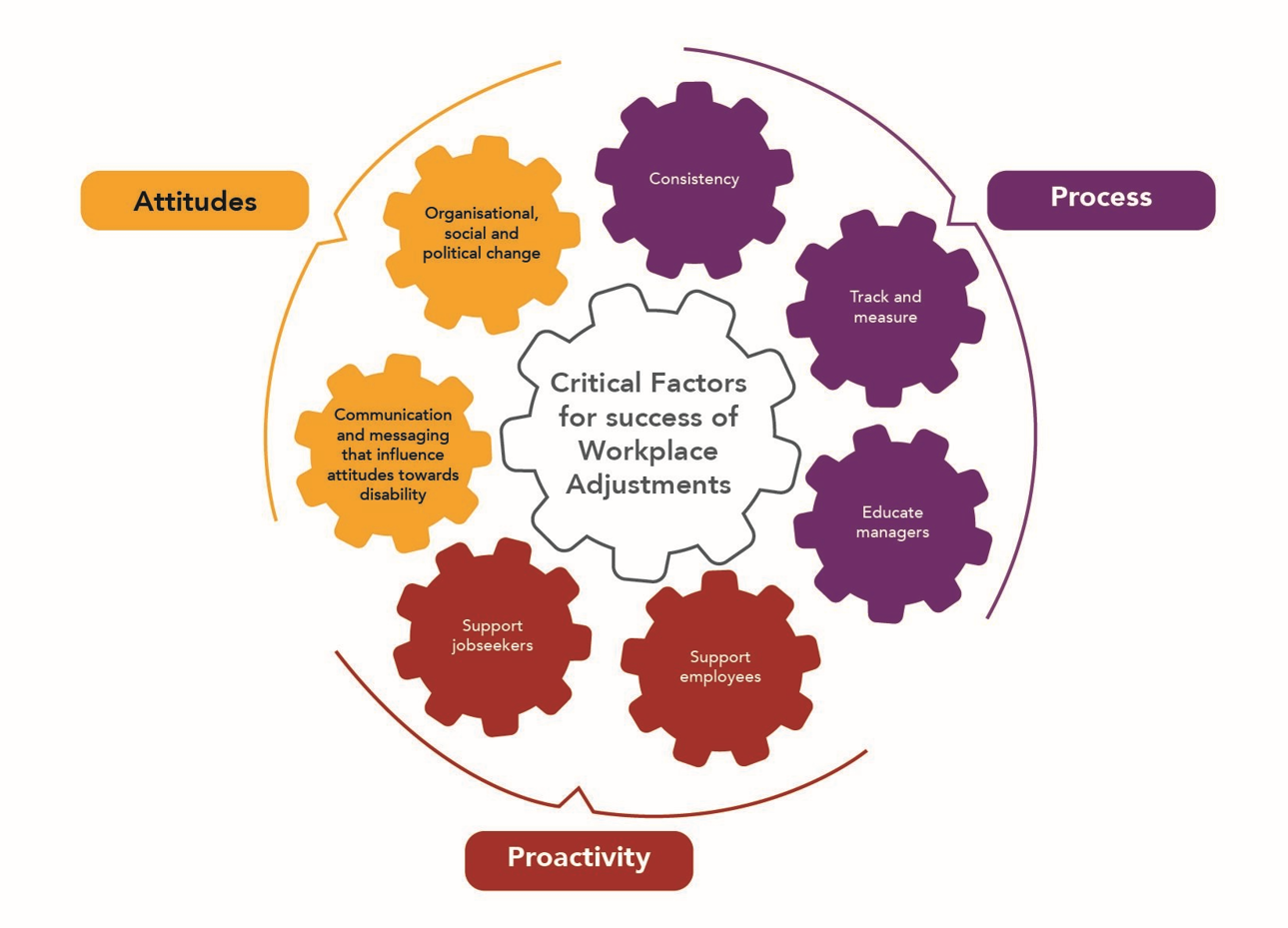Australian Disability Network’s research about workplace adjustments provides an evidence base for organisations seeking to:
- Develop, improve and sustain workplace adjustments practices through policy and processes.
- Proactively provide multiple accessible opportunities for employees and jobseekers to engage with the organisations’ workplace adjustments messaging about information and processes. Influence attitudinal changes at individual, organisational and systemic levels.

The 7 critical factors for success of workplace adjustments are based on iterative thematic analysis of what people with disability and organisations said in surveys, interviews and focus groups about their experiences. This practical evidence base is intended to support organisations to be confident about employing people with disability to have long and satisfying careers.
Seven critical factors for success
Factors to process
1. Consistency:
Employers should:
- Take a consistent approach to workplace adjustments through developing and following a policy.
- Investigate systems that support workplace adjustments processes, for example: a centralised workplace adjustments process coordinated by a designated workplace adjustments officer, and a workplace adjustments passport system that confidentially documents an employee’s adjustments.
2. Track and measure
Employers should:
- Track and measure workplace adjustments to ensure they are effectively implemented in a timely way, and to gauge levels of satisfaction.
- Act on feedback data from employees and review adjustments regularly.
3. Educate and support managers.
Employers should:
- Build the confidence and capability of line managers about workplace adjustments, through training, coaching or mentoring.
- Ensure that the whole organisation at all levels provides resources to support managers to confidently and confidentially discuss and implement workplace adjustments.
- Provide training to the whole organisation about disability awareness, including non-visible disability, differences in communication styles and behaviours, attitudes and unconscious bias.
Factors related to setting people with disability up for success in the workplace and during recruitment.
4. Support for employees
Employers should:
- Avoid “singling out” people with disability, rather provide opportunities for confidential sharing of information and ensure it is stored securely.
- Actively listen, believe and trust employees when they ask for an adjustment, without interrogation or shaming.
- Have regular check-in conversations about how adjustments are going for individuals.
Provide advocacy support where necessary.
5. Support for jobseekers
Employers should:
- Proactively demonstrate organisational values of inclusion by commitment to setting jobseekers up for success.
- Offer adjustments at every stage of recruitment, starting with the job advertisement.
- Not expect jobseekers to share information about disability in order to get adjustments during the recruitment process – instead, offer adjustments to all applicants.
- Make every interview accessible from the start, so no-one needs to ask for adjustments, and provide flexible times for interviews for everyone.
- Include a person with disability on interview panels.
- Appoint a designated workplace adjustments officer to assist with requests for adjustments, or a disability confident person to support applicants through the recruitment process.
Factors related to attitudinal barriers and the need for culture change:
6. Communications and messaging
Employers should:
- Use communications and messaging that influence attitudes towards disability.
For example, provide frequent, consistent and accessible messaging across the organisation that workplace adjustments are not “extra” or a “favour”, but exist to provide equity and enablement so that every employee can fulfil the essential requirements of their role.
Reduce fear of discrimination by making adjustments available to everyone without requiring information about disability to be shared.
- Reduce fear of discrimination by making adjustments available to everyone without requiring information about disability to be shared.
7. Organisational and broader social and systemic change
- Consider ways to influence at organisational and government levels
For example, provide support for mechanisms such as DENs (Disability Employee Networks) that enable employees with disability to engage as a collective to share lived experiences, and to inform and educate the community and policy makers about the urgency and benefits of sustainable reform in the area of employment and disability.
- Lobby for policy and legislation to support workplace adjustments as a way of enabling the human rights of people with disability to work, as outlined in Article 27 of the United Nations Convention on the Rights of Persons with Disability.
- This includes providing feedback to services that support workplace participation of people with disability, to ensure the services are responsive and accessible.
Reference:
Australian Disability Network. (2024). Getting workplace adjustments out of the
“too hard basket.” Australian Disability Network.